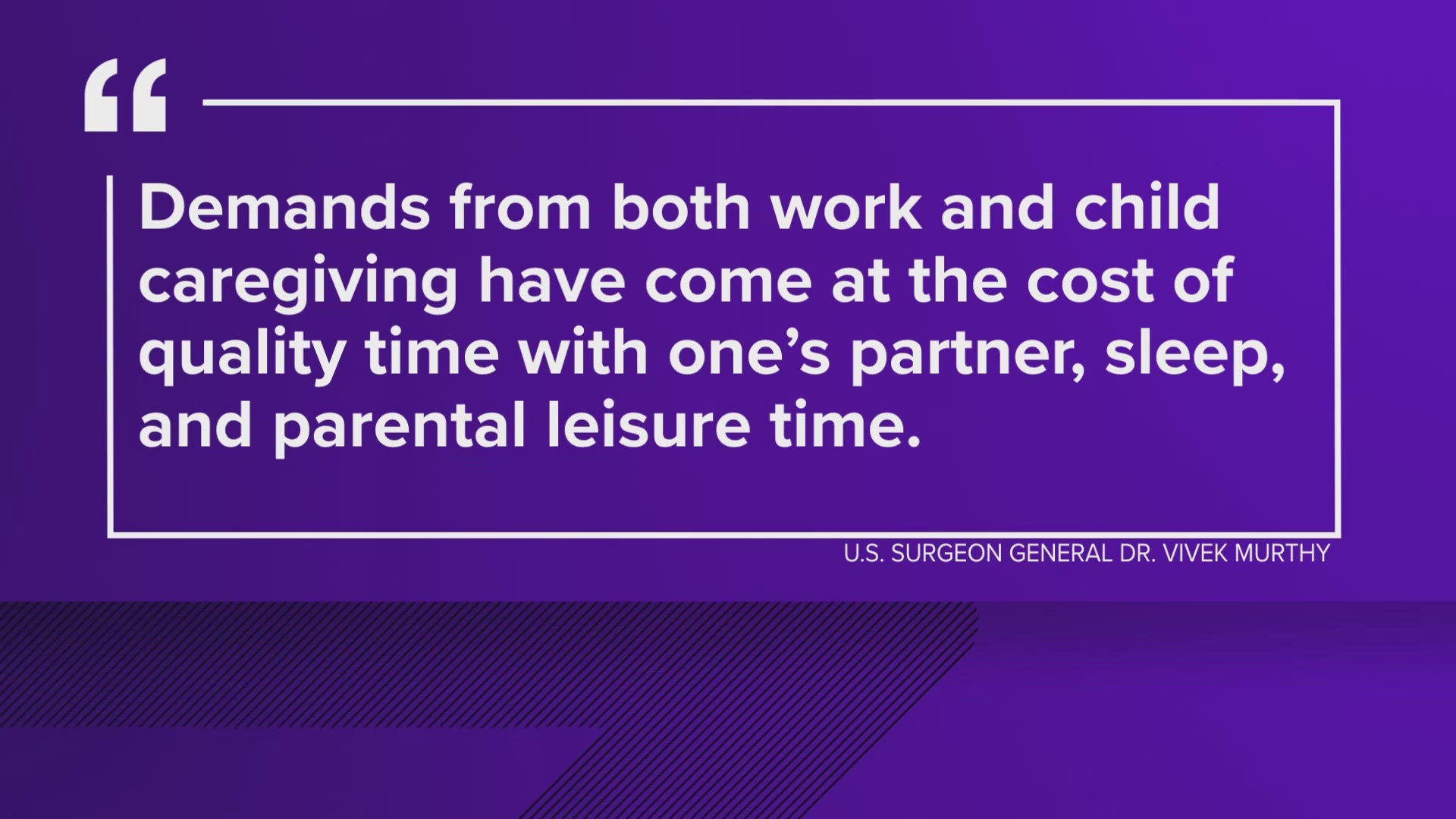WASHINGTON D.C., DC — The Department of Health and Human services reports that America's parents need help. A new advisory says parental stress is increasing to alarming levels. That's bad news for parents and kids.
The advisory titled "Parents Under Pressure" was released on Aug. 28. It paints a grim picture of parents whose stress increased sharply during the pandemic and never came back down.
- 41% of parents reported being so stressed they cannot function on most days
- 48% reported that most days their stress was "completely overwhelming."
Those are both almost twice the rates for adults without children.
- 20% of adults without children reported being so stressed they cannot function most days
- 26% of adults reported "completely overwhelming" stress most days.
The extra stress of parenting, and the way it impacts parents, can cause long-term issues for everyone. The report outlines why parents are so stressed and what can be done about it.


Why is parenting so stressful?
Parenthood has never been easy. But in some ways it is getting harder and more expensive.
Nationally, the price of child care has grown by about 26% over the last ten years. One in four U.S. parents say there have been times in the last year where they have not had enough money for basic needs.
- 66% of parents report being "consumed by worries" about money
- 39% of adults without children felt the same way
Parents are also having to balance parenting with more work. Moms are working about 28% more each week than they were in 1987. Dads hours are growing, up 4% in the same period.
The average American mom works 26.7 hours a week
The average American dad works 41.2 hours a week
At the same time, parents are also more focused on kids. Despite longer hours they are spending more time actively taking care of their kids.
- Moms are spending 40% more time on childcare than they were in 1987. An average of 8.4 hours a week.
- Dads are spending 154% more time on childcare than they were in 1987. An average of 6.6 hours a week.
Childcare here means everything from dressing them to taking them to after school activities.
On top of that, about 23% of adults are taking care of a child and a parent over the age of 65.


More work and more problems
Parents are also facing more worries for their children than previous generations. One in five American children now has what the government terms a "special healthcare need." Their parents are twice as likely to report "fair or poor mental health" when compared to parents of kids without those needs.
Parents are also worried about things outside the home. For example, 74% of parents described the possibility of a school shooting is a significant source of stress.
Technology and social media are the two most common reasons parents say parenting is harder now than 20 years ago.
- More than 50% of parents are worried technology will hurt their child's mental health.
- 71% are worried that it will expose their child to explicit content
Parents aren't immune to social media. Parenting pages and blogs constantly bombard parents with messages about how they should be parenting, increasing parental stress.


Why parental stress matters
Stressed parents are bad for kids. It increases the risk of mental illness, which can have a lifelong impact on both the parent and the child.
The mental health of both parents has an impact on children.
Research indicates that "maternal distress" during the period immediately before and after a child's birth increases their risk of mental health problems.
There has been less research on how a father's mental health impacts a child's well-being. But the available information finds the impact can be significant.
Stressed parents are also less productive. Multiple studies have found that stress lowers productivity at work, costing employers billions of dollars.


RELATED: New parents in Baltimore could get a $1,000 'baby bonus' under a proposal to fight child poverty
What can we do about it?
The report calls on everyone, from the government to employers, to show more respect and value for caregivers.
The report also calls in more investment in caregiving including more resources for the health, education and safety of children.
The report also wants parents to talk more openly about the stress of raising children. Most parents report they feel isolated by the stress and don't have anyone to talk about the stress with.
The report also calls for fostering "a culture of connection" among parents. That means parents providing more support for one another and making space for them to share experiences and ideas.
The report calls on national, state and local governments to provide more support for parents, including:
- Funding for parental support programs
- Paid family and medical leave
- Investing in marginalized communities
- Improve access to mental health care for parents
- More support for formerly incarcerated parents
The report also calls on employers to expand policies that support the well-being of parents and caregivers.
The report also recommends that employers train managers to promote work-life balance and provide better mental health care for employees.
You can read the full HHS report here.

